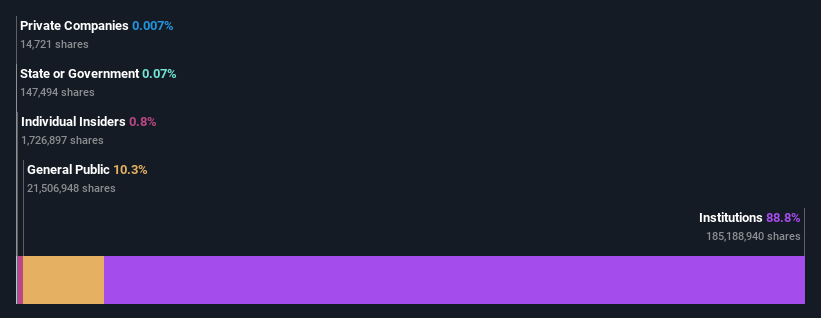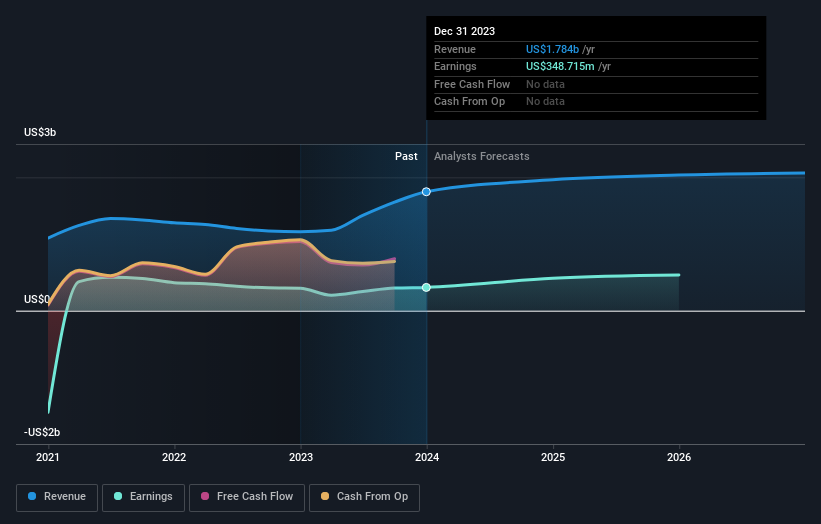- United States
- /
- Banks
- /
- NasdaqGS:COLB
Institutional investors may adopt severe steps after Columbia Banking System, Inc.'s (NASDAQ:COLB) latest 3.4% drop adds to a year losses

Key Insights
- Institutions' substantial holdings in Columbia Banking System implies that they have significant influence over the company's share price
- A total of 14 investors have a majority stake in the company with 51% ownership
- Recent purchases by insiders
To get a sense of who is truly in control of Columbia Banking System, Inc. (NASDAQ:COLB), it is important to understand the ownership structure of the business. And the group that holds the biggest piece of the pie are institutions with 89% ownership. That is, the group stands to benefit the most if the stock rises (or lose the most if there is a downturn).
And so it follows that institutional investors was the group most impacted after the company's market cap fell to US$3.9b last week after a 3.4% drop in the share price. Needless to say, the recent loss which further adds to the one-year loss to shareholders of 38% might not go down well especially with this category of shareholders. Often called “market movers", institutions wield significant power in influencing the price dynamics of any stock. As a result, if the decline continues, institutional investors may be pressured to sell Columbia Banking System which might hurt individual investors.
Let's delve deeper into each type of owner of Columbia Banking System, beginning with the chart below.
Check out our latest analysis for Columbia Banking System

What Does The Institutional Ownership Tell Us About Columbia Banking System?
Institutional investors commonly compare their own returns to the returns of a commonly followed index. So they generally do consider buying larger companies that are included in the relevant benchmark index.
Columbia Banking System already has institutions on the share registry. Indeed, they own a respectable stake in the company. This suggests some credibility amongst professional investors. But we can't rely on that fact alone since institutions make bad investments sometimes, just like everyone does. If multiple institutions change their view on a stock at the same time, you could see the share price drop fast. It's therefore worth looking at Columbia Banking System's earnings history below. Of course, the future is what really matters.

Institutional investors own over 50% of the company, so together than can probably strongly influence board decisions. Hedge funds don't have many shares in Columbia Banking System. The Vanguard Group, Inc. is currently the company's largest shareholder with 10% of shares outstanding. BlackRock, Inc. is the second largest shareholder owning 8.9% of common stock, and State Street Global Advisors, Inc. holds about 4.5% of the company stock.
A closer look at our ownership figures suggests that the top 14 shareholders have a combined ownership of 51% implying that no single shareholder has a majority.
While studying institutional ownership for a company can add value to your research, it is also a good practice to research analyst recommendations to get a deeper understand of a stock's expected performance. There are plenty of analysts covering the stock, so it might be worth seeing what they are forecasting, too.
Insider Ownership Of Columbia Banking System
The definition of company insiders can be subjective and does vary between jurisdictions. Our data reflects individual insiders, capturing board members at the very least. Company management run the business, but the CEO will answer to the board, even if he or she is a member of it.
Insider ownership is positive when it signals leadership are thinking like the true owners of the company. However, high insider ownership can also give immense power to a small group within the company. This can be negative in some circumstances.
Our most recent data indicates that insiders own less than 1% of Columbia Banking System, Inc.. Keep in mind that it's a big company, and the insiders own US$33m worth of shares. The absolute value might be more important than the proportional share. It is always good to see at least some insider ownership, but it might be worth checking if those insiders have been selling.
General Public Ownership
With a 10% ownership, the general public, mostly comprising of individual investors, have some degree of sway over Columbia Banking System. While this group can't necessarily call the shots, it can certainly have a real influence on how the company is run.
Next Steps:
While it is well worth considering the different groups that own a company, there are other factors that are even more important. For example, we've discovered 3 warning signs for Columbia Banking System (1 makes us a bit uncomfortable!) that you should be aware of before investing here.
If you would prefer discover what analysts are predicting in terms of future growth, do not miss this free report on analyst forecasts.
NB: Figures in this article are calculated using data from the last twelve months, which refer to the 12-month period ending on the last date of the month the financial statement is dated. This may not be consistent with full year annual report figures.
New: AI Stock Screener & Alerts
Our new AI Stock Screener scans the market every day to uncover opportunities.
• Dividend Powerhouses (3%+ Yield)
• Undervalued Small Caps with Insider Buying
• High growth Tech and AI Companies
Or build your own from over 50 metrics.
Have feedback on this article? Concerned about the content? Get in touch with us directly. Alternatively, email editorial-team (at) simplywallst.com.
This article by Simply Wall St is general in nature. We provide commentary based on historical data and analyst forecasts only using an unbiased methodology and our articles are not intended to be financial advice. It does not constitute a recommendation to buy or sell any stock, and does not take account of your objectives, or your financial situation. We aim to bring you long-term focused analysis driven by fundamental data. Note that our analysis may not factor in the latest price-sensitive company announcements or qualitative material. Simply Wall St has no position in any stocks mentioned.
About NasdaqGS:COLB
Columbia Banking System
Operates as the holding company of Umpqua Bank that provides banking, private banking, mortgage, and other financial services in the United States.
Flawless balance sheet 6 star dividend payer.


